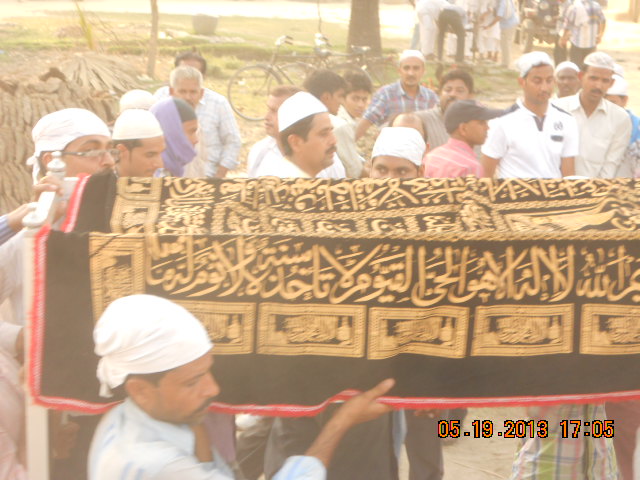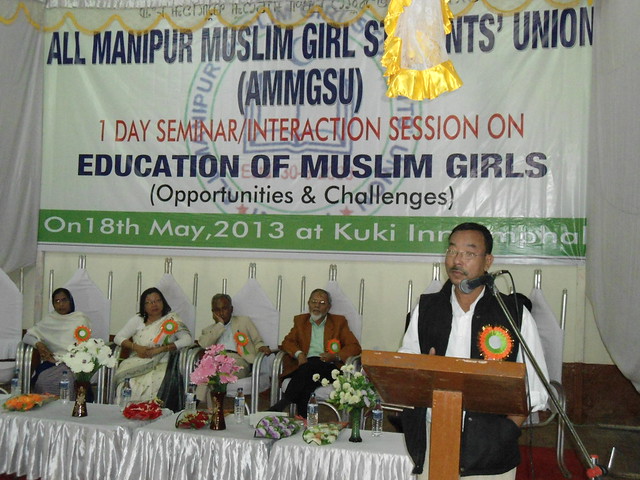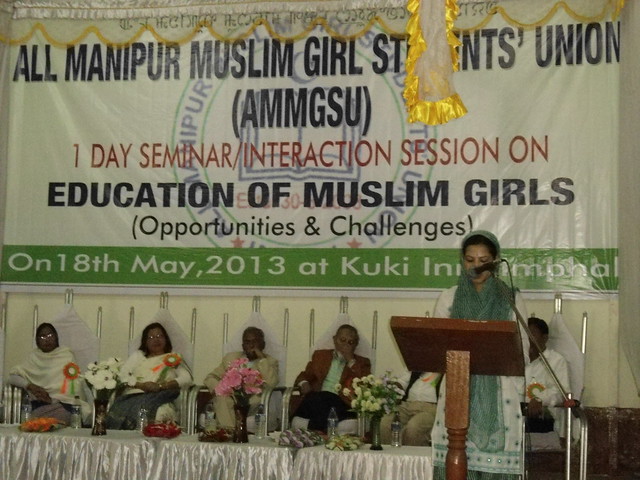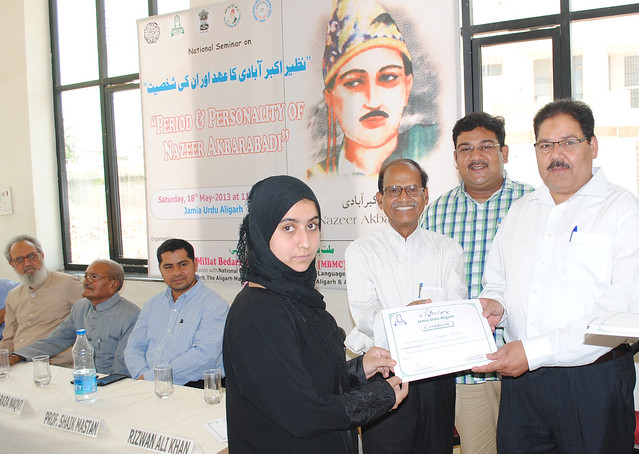By TwoCircles.net Special Correspondent,
Lucknow: Rihai Manch (Forum for the Release of Innocent Muslims imprisoned in the name of Terrorism) has demanded immediate arrest of 42 police intelligence officials against whom FIRs have been registered in connection with the custodial murder of Khalid Mujahid.
Khalid Mujahid who was arrested on charges of serial blasts in 2007 died on Saturday while he was returning from Faizabad to Lucknow jail on Saturday. Khalid fainted on way at Barabanki, according to police and was taken to District Hospital, Barabanki where he was declared brought dead by the doctors. Khalid was under police custody when he died.
click here to see the picture (reader discretion advised)
Khalid Mujahid pic before Post Mortem rihai manch
Zahid’s uncle, Zaheer Alam Falahi, filed an FIR against 42 erring police officials on Sunday morning, including former DGP Vikram Singh, IPS Manoj Kumar, Chiranjeev Lal Sinha, S. Anand as well as against the unknown Intelligence Bureau personnel, for conspiracy and murder.
Postmortem report of Khalid Mujhaid, which took place in Barabanki between 6:30 am to 8:30 AM, remained inconclusive. Doctors have preserved heart and lungs for a finding out a possible case of cardiac arrest, while his relatives took the body to Jaunpur for burial.
However, photographs taken before his body was taken for the autopsy, accessed by TCN, clearly show torture marks on the face and blood clots. Speaking to TCN, his uncle Zaheer Alam Falahi, who saw the dead body in the hospital, confirmed that although his nephew was quite fair, his face appeared to have turned black and that his neck was swollen as if someone twisted it.
Click here to see the post-mortem picture (reader discretion advised)
TCN was first to report the custodial murder of Khalid Mujhaid. Speaking to TwoCircles.net, Advocate Mohammad Shoaib, chairman of the Rihai Manch, had confirmed that he, along with his lawyer Randhir Singh Suman, had met Khalid at the Faizabad court and was with him till 3.15 pm. The interesting thing they had pointed out was that he was wearing Kurta-payjama as usual in court. However, the dead body of Khalid was spotted in a tee-shirt and lower.
Jail superintendent has already gone on record, saying Khalid’s health was normal. Early statement by the UP government said that he might have died due to heat stroke or heart attack.
Rajeev Yadav of Rihai Manch added that the bone of his neck appears to have been broken, and he had several other injury marks on the body. He added that Khalid was never before spotted wearing tee-shirt and lower, and clearly the cops changed his kurta to hide blood marks.
![]()
L-R: Hakeem Tarique Qasmi and Khalid Mujahid
Advocate Mohammad Shoaib of the Rihai Manch told TCN, “To save the conniving officials of ATS, STF and intelligence agencies, police killed Khalid Mujahid.” He added that the torture marks on the body, reveals the agony he might have gone through before his death.
Advocate Shaoib further said that the escort had threatened Khalid even before about killing him in ‘encounter’ and that they had filed written affidavit in court in this regard.
Rihai Manch members warned the SP government that their resolve to fight for the causes of innocent youths will only be strengthened with the ‘martyrdom’ of Maulana Khalid Mujahid.
They also raised the question on Barabanki police handling of issue who have made only local SP leaders as witnesses.
Rajeev Yadav also criticized the chief minister Akhilesh Yadav for not coming to meet the grieving family despite call from several quarters.
For its part, on Sunday UP government has ordered for a CBI enquiry.
Khalid along with Tariq Qasmi was arrested by Special Task Force (STF) on 20 December 2007 from Barabanki. Huge explosives were also shown as recovered from his possession. STF claimed that he was involved in the serial blasts which occurred in Gorakhpur, Faizabad and Lucknow. Later, Nimesh Commission was constituted headed by Justice R D Nimesh who in its report raised fingers over STF's claim about the place of arrest.
Later, Samajwadi Party government headed by CM Akhilesh Yadav as per their poll promise had moved a plea to revoke the terror charges but they were turned down by local court in Barabanki. Process was however going on for withdrawing his case from other districts.
Rihai Manch has also demanded that Rs one crore be given as compensation to the family of the victims.
![]()
Demands of Rihai Manch:
1. Immediately suspend and arrest all 42 polcie officials and intelligence agency personnel including, former DGP Vikram Singh, ADG (law & order) Brij Lal, IPS Manoj Kumar Jha, Chrianjeevnath Sinha, S Anand, and the escort of Khalid Mujahid against whom FIR has been registered.
2. Keeping up its poll promises SP government should immediately release Tariq Qasmi, as the murder of Khalid clearly shows that the government has miserably failed in giving security to Muslim youths arrested in the name of terror.
3. Immediately table the Nimesh Commission report in the Assembly that clearly exonerated Tariq Qasmi and Khalid Mujahid by raising suspicion on government’s version.
4. Immediately initiate time bound CBI enquiry in the death of Khalid Mujahid.
5. Bring home secretary, Barabanki magistrate and public persecutor within the ambit of the investigations, all of whom delayed Khalid’s release by ‘conniving’ in rejection of the plea for the withdrawal of the cases.
6. Police personnel who pressurized Tariq Qasmi to lie in court saying that Khalid was ill too should be brought within the ambit of the investigation, as his advocate Mohamamd Shoaib as well as jail superintendent has stated to the contrary.
7. Step up the security of prisoners across state, particularly those who are behind bars on charges of terror.
8. Give Rs one crore as compensation to the family of the victims.

















